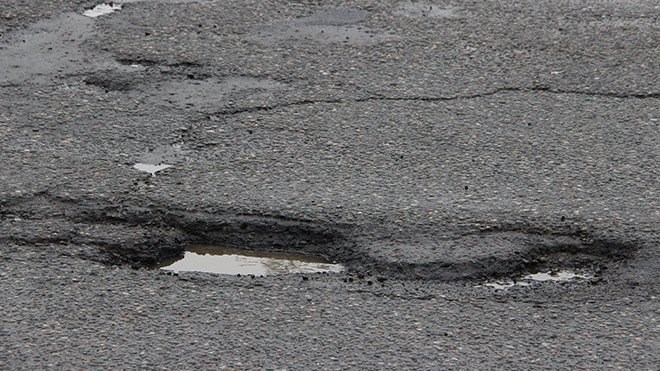Questions about the impact of recycled material used in making asphalt in Sudbury and Ontario reached city council this week.
Ward 12 Coun. Joscelyne Landry-Altmann asked whether the city has looked at switching to a more expensive asphalt Timmins is considering using, one that doesn't contain used motor oil that a Queen's University researcher has concluded is causing roads to crumble.
Considering the city spends $32 million a year building and rebuilding roads, Landry-Altmann said a report on the differences between the two asphalt formulas would be worthwhile.
“Are we considering buying expensive asphalt?” she asked. “And what are the differences, really?”
She was hoping for a report well in advance of next year's budget so councillors could be certain they were spending the money wisely.
“So at least we'd be ready for the 2016 budget.”
As first reported by Northern Ontario Business editor Ian Ross earlier this month on Northernlife.ca, Queen's polymer chemist and professor Simon Hesp says his research has concluded the use of motor oil in asphalt can explain why many roads in Ontario begin to crack and crumble faster than expected.
“It’s like putting an old engine in a new aircraft – in a few years, it’s a total disaster,” was how Hesp described the problem to Ross. “We’ve found motor oil in about 50 per cent of asphalt cement in Ontario, and that is the cause of massive amounts of failure. It probably takes off five to 10 years of a life cycle of road.”
Hesp said using lubricants as a binding agent to an adhesive – like road aggregate – won’t produce roads that last. Once temperatures plunge in winter, the oil separates from the aggregate “like cheese loses water,” micro-cracks appear and eventually potholes, by the spring thaw.
“Many times we’ve investigated pavements that cracked before the (one-year) warranty started,” he said. “They had not finished work on the job. That’s what really upsets municipalities, when it starts in the first year or before the warranty starts.”
In response to Landry-Altmann's question, Infrastructure GM Tony Cecutti said the city uses an asphalt mix that matches what's known as “provincial standards specifications,” a province-approved formula that allows the use of a certain amount of recycled material.
“That's certainly the standard at this time and we follow those standards,” Cecutti said. “But there has been some research suggesting that maybe the standard should change. We're certainly following that very closely.
“We have not adopted that policy yet, but it's certainly something we're monitoring very closely.”
Cecutti said the research is an ongoing initiative between the Municipal Engineers Association, the Ministry of Transportation and the asphalt suppliers to determine whether changes are needed to provincial standards.
“I can't give you a definitive date as to when that will be available,” he said. “Certainly, any updates that come to our attention, we'll be happy to share with you.”
Mayor Brian Bigger, who won an award for his work of an audit of the roads department in 2012 when he was auditor general, said the debate on the impact recycled motor oil has on the longevity of the roads has been around for awhile.
“I think it might be useful to have an expert or a number of experts to come and provide some information to council,” Bigger said. “There is a debate on what the impact (motor oil) might have on the asphalt. It might be difficult to define what the effect is for different mixes of asphalt.
“But because it has recycled content, it could have an effect on the useful life of the asphalt … That is what they are trying to determine now.”
While Cecutti said a report could be ready by the fall for the city's operations committee, Landry-Altmann pushed for the report to go to city council, instead. Roads are one of the most common questions councillors get from residents, she said.
“Because our roads are deteriorating,” she said. “It's what we hear about all the time.”
– With files from Ian Ross
Join Sudbury.com+
- Messages
- Post a Listing
- Your Listings
- Your Profile
- Your Subscriptions
- Your Likes
- Your Business
- Support Local News
- Payment History
Sudbury.com+ members
Already a +member?
Not a +member?
Sign up for a Sudbury.com+ account for instant access to upcoming contests, local offers, auctions and so much more.
